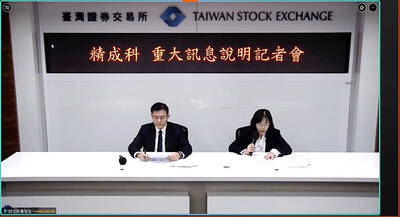Although the real estate market has yet to bottom out, several domestic banks are gearing up to compete for new mortgage business.
One day after the Cabinet said it would release another NT$200 billion (US$5.92 billion) in preferential mortgage loans with an annual interest rate as low as 1.325 percent, DBS Bank (星展銀行) yesterday launched mortgage loans with a two-year fixed rate of 1.88 percent.
After that period, the interest will float at 1.12 percent above the time deposit index, which would be 1.88 percent at the current level.
“That will be the lowest interest rate available on the market for up to two years,” DBS general manager Jerry Chen (陳亮丞) said, adding that the program would run until June 30.
With more than NT$10 billion available for mortgages, DBS plans to grant mortgages with a loan-to -value ratio of up to 80 percent.
The bank said its mortgages would average 1.88 percent interest in the first three years — lower than mortgages at state-run banks and foreign banks.
Bank of Taiwan (臺灣銀行) offers mortgages with an initial 1.833 percent interest rate in the first six months before rising to between 2.049 percent and 2.249 percent, while Land Bank of Taiwan (土地銀行) and Taiwan Cooperative Bank (合作金庫銀行) grants mortgages with an initial minimum 1.5 percent rate for six months before climbing to between 1.99 percent and 2.25 percent.

SEMICONDUCTORS: The firm has already completed one fab, which is to begin mass producing 2-nanomater chips next year, while two others are under construction Taiwan Semiconductor Manufacturing Co (TSMC, 台積電), the world’s largest contract chipmaker, plans to begin construction of its fourth and fifth wafer fabs in Kaohsiung next year, targeting the development of high-end processes. The two facilities — P4 and P5 — are part of TSMC’s production expansion program, which aims to build five fabs in Kaohsiung. TSMC facility division vice president Arthur Chuang (莊子壽) on Thursday said that the five facilities are expected to create 8,000 jobs. To respond to the fast-changing global semiconductor industry and escalating international competition, TSMC said it has to keep growing by expanding its production footprints. The P4 and P5

Printed circuit board (PCB) maker Global Brands Manufacture Ltd (精成科技) is to fully acquire Japanese peer Lincstech Co for about NT$8.4 billion (US$256.9 million) as the company aims to add high-end PCBs to its PC-centric product lineups. The company also expects the deal to help expand its manufacturing sites in Southeast Asia, as local firms diversify to mitigate geopolitical risks. “The acquisition will mean an important step for the company to further expand its presence in Southeast Asia and globally,” Global Brands Manufacture chief financial officer Weng Chia-yu (翁家玉) said at a news conference in Taipei yesterday. The company has set up manufacturing

DOWNFALL: The Singapore-based oil magnate Lim Oon Kuin was accused of hiding US$800 million in losses and leaving 20 banks with substantial liabilities Former tycoon Lim Oon Kuin (林恩強) has been declared bankrupt in Singapore, following the collapse of his oil trading empire. The name of the founder of Hin Leong Trading Pte Ltd (興隆貿易) and his children Lim Huey Ching (林慧清) and Lim Chee Meng (林志朋) were listed as having been issued a bankruptcy order on Dec. 19, the government gazette showed. The younger Lims were directors at the company. Leow Quek Shiong and Seah Roh Lin of BDO Advisory Pte Ltd are the trustees, according to the gazette. At its peak, Hin Leong traded a range of oil products, made lubricants and operated loading

The growing popularity of Chinese sport utility vehicles and pickup trucks has shaken up Mexico’s luxury car market, hitting sales of traditionally dominant brands such as Mercedes-Benz and BMW. Mexicans are increasingly switching from traditionally dominant sedans to Chinese vehicles due to a combination of comfort, technology and price, industry experts say. It is no small feat in a country home to factories of foreign brands such as Audi and BMW, and where until a few years ago imported Chinese cars were stigmatized, as in other parts of the world. The high-end segment of the market registered a sales drop